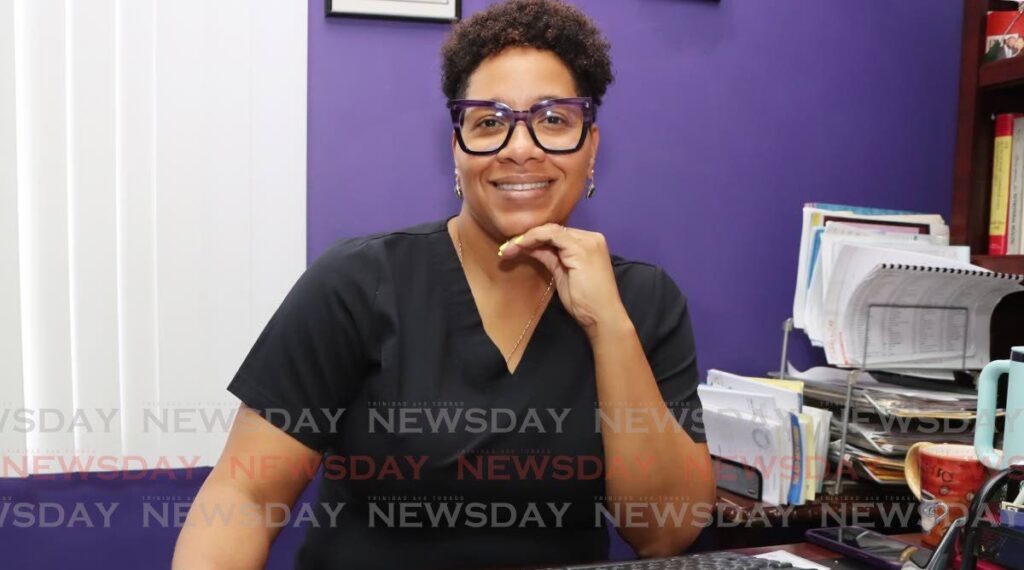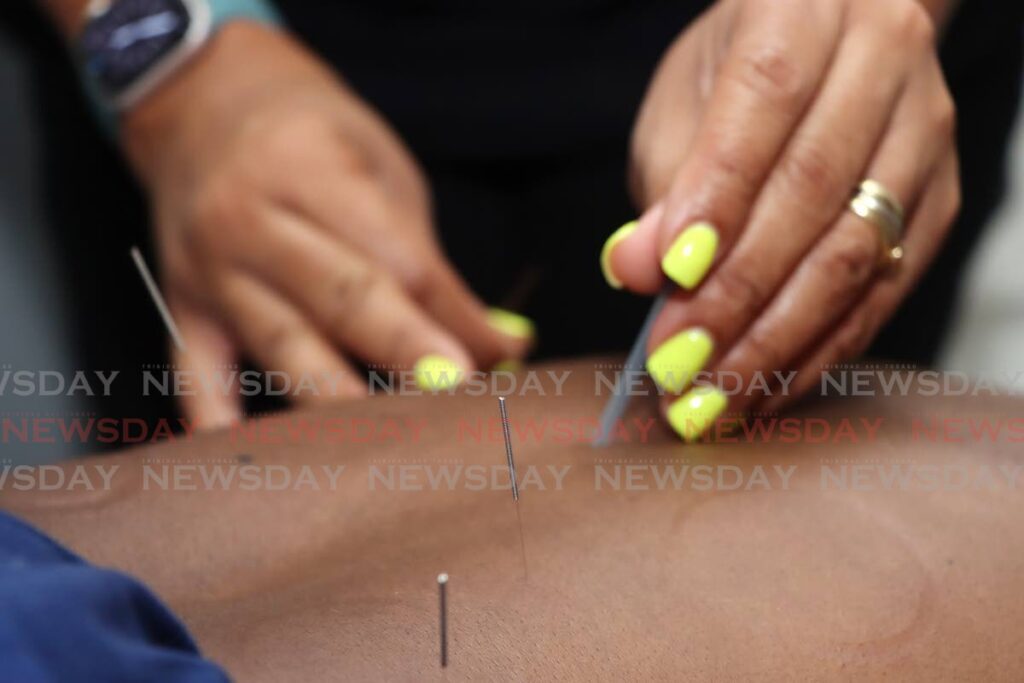Dr Asante Le Blanc uses integrated approach to treat menopause

THE effects of menopause, whether in the early or late stages, is a topic that is slowly creeping into public conversations.
Talking about the dreaded hot flashes and night sweats, low libido, anxiety, insomnia, fatigue, irritability, urinary issues, and yes, even the stubborn belly fat, is no longer as taboo as it used to be.
A woman is said to be in menopause 12 months after her last period. In the years leading up to menopause, she may experience changes in her monthly cycles. This is referred to as perimenopause and usually begins between ages 45 and 55.
Certified medical herbologist Dr Asante Le Blanc told WMN, “I call it (menopause) the Hydra of women – ” a serpent-like water monster with nine heads that is often referenced in Greek mythology.
“It has so many heads, and when you cut off one head, three grow back,” she chuckled.
At her Victoria Clinic branches in Port of Spain and San Fernando, and retail clinic in Trincity, Le Blanc takes an integrated approach to healthcare using conventional and traditional medical practices – one that won her the Top Performing Candidate in the Scotiabank Vision Achiever Programme in 2018.
She said the symptoms of menopause are among the many ailments with which she has seen patients struggle, and has been using unconventional options like acupuncture and herbs to treat them.
“I have seen women really benefit from these treatments – the low libido, vaginal dryness, the aches and pains – I’ve seen how acupuncture, herbs and teaching them how to eat and exercise has brought relief. It’s very simple things, they just need to listen to their bodies.

“It’s never too late to start. There are simple things like cucumber water or eating cucumbers every day with a little salt, or even walnuts. These things help,” as does acceptance of what menopausal women are now facing.
“Not trying to combat it and not being fearful of the transition itself. That, to me, is what helps them get holistically through that journey and that period.”
Le Blanc said the bombardment of ads on social media are making women more aware of what is going on with their bodies as they enter perimenopause and menopause, and they are speaking up.
“And I don’t know if we’re speaking more about it because our symptoms appear to be more pronounced because of our way of life and the foods that we have been eating has changed so much from long ago, but the conversations are getting louder.”
She said while many countries in the Caribbean haven’t yet fully accepted integrated medicine, it is something she was taught as a medical student at the Superior Institute of Medical Sciences of Havana in the Manuel Fajardo Faculty, Cuba.
Le Blanc was born in Cuba and grew up in Guyana. She did her first year of medical school in Guyana, then returned to her country of birth to complete her studies.
“As medical students we went to clinics during our training and we were introduced to different herbs…The (US) embargo on Cuba caused a lot of issues with supplies of drugs, so Cuba had to make a lot of its own pharmaceuticals.
“They went back to basics, so in addition to Western medicine, we were introduced to it (herbs), and then in our fifth year, we were introduced to acupuncture and cupping.”
She said in all genres of her training, she was taught to find the cause of the issue and then treat it, which sometimes required an integrated approach. She is trained in Western, traditional Chinese and Ayurvedic medicine. Sometimes, she said, each can stand on its own, other times a marrying of the techniques is required.

“I tell people it doesn’t have to be either or, it can be complementary because a lot of what we have learned in any type of medicine is about understanding the patient, understanding the root problem. So it’s not just putting a plaster on a sore.
“With perimenopause and menopause you understand the imbalance, and that not every woman’s menopause experience is the same. While it’s a common diagnosis, there are different patterns so the treatment would differ.”
She said everything in life has potential side effects, but when it comes to acupuncture and cupping, these are minimal. Herbs, on the other hand, can have many side effects and medical practitioners should have a thorough understanding of the patient and their conditions before prescribing them.
“So my formulas are not a one-size-fits-all, it’s based on a consultation. My patients are monitored very closely. I’m always very careful and let them know it’s a very dynamic situation.
“I always tell them, ‘Let me know how you’re feeling; nothing you’re feeling is too small.’”
She said herbs, in any situation, have the potential of a healing crisis – feeling worse before you feel better.
“Just like when you take pharmaceutical medication. The Chinese believe that is because the herbs are working and producing an effect…But as a doctor you have to let the patient know how and when to reach out to you. They have to be carefully guided because herbs are not things you play around with. Remember, most of our medicines come from herbs, and therefore the understanding of the potential effects of herbs are important.”
And contrary to popular belief, LeBlanc said, any one herb, no matter how popular, will not work with everyone.
“Everyone may want to take primrose, but it might not work for every woman. That’s why it’s important to have a consultation because a formula is needed. You have to know how to make it to treat each woman individually.”
Le Blanc does not prescribe supplements, but said if someone asks her about something she know about, she may advise them.
“But my treatment package does not include supplements.”
And although she grows her own herbs for personal use in her kitchen garden, the herbs she uses in formulas for her patients are imported.
“I prefer to have proper quality control, so I have specific suppliers and I make sure it’s cleared by the FDA.”
Le Blanc advises women who decide to undergo complementary treatment for their symptoms to make sure they are under the supervision of a trained medical professional.
“You may see these ads and videos on social media saying, ‘take this,’ or ‘take that’ but remember herbs have side effects. There’s herb/drug interaction, you have to look at the concentration, the dosing, things like that.”

She said another important tool in navigating the maze that can be menopause is understanding the importance of how you eat.
“Some women go crazy. ‘I can’t have salt. I can’t have sugar or gluten,’ and they are empty because they refuse to eat this and that.
“We don’t have to have smoothies all day, or eat raw foods all the time. Is it that we must never eat meat again? We need to understand our body and what it needs…We have to now find a delicate balance and eat things in moderation to allow for an enjoyable life. If we learnt just one thing from the pandemic, it’s that life is short and we have to enjoy it.”
Another thing that can help alleviate the discomfort of menopause, she said, is the power of the sisterhood.
“We have to learn how healing comes through the sisterhood…I am actively working on something right now. One day, we may just probably run into the bush for a retreat to explore different things we can do to help each other… All of us go through it (menopause).”
She said younger women would do well to start preparing themselves for the transition that inevitably comes.
“From the minute we are conceived, the majority of us begin going through a hormonal journey. And I think our lifestyle has not allowed us to be as proactive when it comes to balancing and preparing for those natural changes and transitions that are going to come. But we should.
“It’s like you have your overdraft and you keep topping it up and waiting because you know you will get hit with something. And when you get hit, you will not be over your overdraft limit because you have your reserves and you’re ready.”
Le Blanc encourages younger women to make sure they are in tune with their bodies, understand what they’re feeling and look closely at their lifestyle.
“How they’re eating, exercising, sleeping. Try to get your body in balance and prepared for that change that’s going to come. Those things help when that transition actually occurs.”
Her vision for Victoria Clinic is that it will continue being the home for holistic healthcare in Trinidad and Tobago, and that she and her team can continue guiding their patients on their journey to optimum health.
“When you step into the clinic you must feel like you’re in a place of healing and support.”
The clinic was established in 2009, and the first retail clinic was opened at Massy Stores in Trincity in 2023.
“I’m at each branch, so I have specific days for each branch. I’m the only integrative practitioner and I’m all about explaining and supporting women on the different things they can do to help them really feel great as they transition.”


Comments
"Dr Asante Le Blanc uses integrated approach to treat menopause"